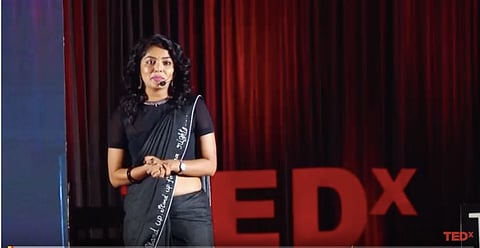

Popular Malayalam actor Rima Kallingal recently spoke about confronting gender discrimination in the film industry in a TedX talk organised in Kerala.
Rima began her talk with a little anecdote about how her journey towards feminism began.
"I'm a feminist and my feminism started with a fish fry. So, once upon a time, my family was seated around the dining table with my grand-mom, dad, my brother and myself. My mom is serving food and never in her entire life has it occurred to her that she can actually sit down along with us and we can all serve our own food. But that story is for another day. And today, she does three fish fries and she makes sure that the oldest one at the table and the two men at the table get one each. The 12-year-old me sees this and weeps. I'm deeply hurt and I demand to know why I am not considered deserving of the fish fry," she said.
Adding that her mother was "flabbergasted" by her demand, Rima went on to say that the former had probably never got the coveted fish fry all her life and couldn't understand why her daughter had a problem.
"But then that’s how my journey of questions began," the actor said.
While her speech has been lauded by many on social media, there are others who are wondering what the correlation between fish and feminism is. They seem to believe that Rima should be given a fish fry or two to settle the issue. Over the past few hours, many have taken to social media, ridiculing and belittling Rima. The series of comments seem to have started after Mathrubhumi published an article on her TedX talk with a headline: "Aa varutha 3 meen kashnangalanenne feminist aakkiyathu" (It is those 3 fish fries that made me a feminist.)
Need we say that several have clearly missed the point that Rima was making about how gender discrimination happens in everyday life - from who eats what on the family table to the yawning gender pay gap?
Let's look at some facts to understand the point Rima was making.
Hello, facts; bye trolls
Did you know that 51% of Indian girls and women between the ages of 15 and 49 are suffering from anemia?
No? The Global Nutrition Report 2017 released on November 3 last year, will tell you so.
Did you know that many women in the country do not eat along with their families, and most often end up eating last? This also means that they do not get as much food - in quantity and quality - as the others.
An article titled 'Why Indian Women Must Eat With Their Families, And How It Can Change India' published in India Spend in 2017, states that the practice of most Indian women eating their meal after the entire family has eaten, makes women and children "hungrier and sicker."
Among the rural poor especially, food distribution is hardly based on need. The breadwinner of the family (most often male), gets sufficient food, then the children get the next share and the women eat what is left by the rest of the family.
This is referred to as intra-house food consumption disparity.
As part of the Rajasthan Nutrition Project implemented in poor tribal communities in the southwestern district of Sirohi and eastern district of Banswara over a period of two years, it was found that 31% of women reported that their husbands alone decided how much food should be served to the family.
In many households, even now, the practice of prioritising the needs of the men in the family continues. As Poornima Menon, a senior research fellow at the International Food Policy Research Institute (IFPRI) has pointed out in this interview, gender discrimination (which affects the health of the mother) is a factor in low birth weight and malnutrition in children.
According to the Rapid Survey on Children (2012-13), four in ten children are stunted. Reporting on the survey in 2017, The Hindu noted that many Indian women start pregnancy underweight and gain little weight during pregnancy. And what does this lead to? Low birth weight babies, high rates of neonatal mortality, and less successful breastfeeding. Women’s undernourishment contributes substantially to India’s unacceptably high rates of child stunting, the report points out.
Increasing access to food and supplies alone cannot change this; the solution is to empower women and give them decision-making powers within the family.
Does Rima cribbing about a fish fry she did not get as a child start making more sense now?
One can point out that Rima comes from a comparatively more privileged background. However, it is a misconception that gender discrimination happens only in poor or rural households. Subtle forms of everyday gender discrimination are common across social classes. The preferential treatment can range from reserving the best cuts of meat for the boy child to denying education and career opportunities on the basis of gender. It needn't always be in your face, violent and immediately visible.
It could very well be a fish fry you never got. And still don't get.